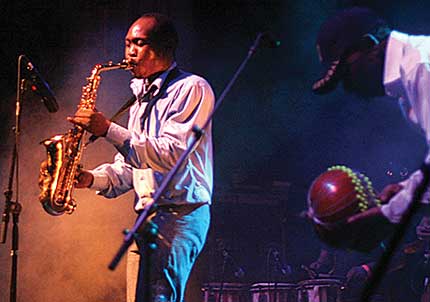Tag: Music
Musicians’ stories join their music in Sound Tracks for PBS
Steve Talbot worked in public TV for more than 20 years before trying his hand as chief fundraiser for one of his ...The ears have it: classical that’s upbeat, melodic, forward-moving
Looking to lift up your midday radio audience? Try some uplifting music. That’s a lesson from 10 classical radio stations that have been ...For WAMU and its listeners, HD Radio means more slices of pie to go around
As a self-proclaimed evangelist for HD Radio, I am often asked why I have inculcated it so deeply in the workings of ...Two public radio webcasting royalty pacts
Comparison of previous webcasting royalty deal with new terms negotiated under the Webcaster Settlement Act of 2009Austin City Limits rides its brand downtown
Austin City Limits is a hot commodity based on a cool brand built over 33 years on PBS. In two years it moves its ...Gene Parris, 82
Gene Parrish, a longtime pubradio broadcaster known for his programs on classical, jazz, opera and choral music, died Jan. 2 [2009] of ...Casual, serious listeners agree on sounds of music: some you love to hear
Most listeners to classical music radio decide whether or not to listen based primarily on the sound and the emotional impact of ...Study’s answers are questionable — and the question aims too low
The Midday Classical Music Testing Project, presented by Public Radio Program Directors at its conference in September [2007], is fundamentally flawed in ...Media veteran brings wary revolution to a fortress of tradition
In the 1980s, Peter Gelb produced 25 Metropolitan Opera broadcasts for PBS. Now, as the Met’s general manager, he runs the red-carpeted ...Grammy academy salutes McPartland for ‘timeless legacy’ of music
The Recording Academy presented a 2004 Trustees Award to jazz pianist and public radio host Marian McPartland. The award recognizes “music people ...Triple-A strikes chord with disenchanted listeners
One musical voice gaining ground on public radio sounds a little scruffier than the rest. Rather than a viola or sax, it ...Marian McPartland: still going full tilt
When the NPR-distributed program Piano Jazz had its 20th anniversary in 1999, Current Contributing Editor David Stewart wrote this profile of the program and its host. ...Jazzcasters try music testing to pick cuts
The minority of public radio stations that use listener preference data to choose music is becoming a little less minor as music ...Who public radio broadcasters are: members of a congregation, with our listeners
This is the view from Martin Goldsmith, then host of NPR’s daily classical music program Performance Today, who served as announcer, producer and program ...Rock ’n roll pilgrimage
Admired series disappears into copyright limbo Followup, 2008 The series contained so many musical clips that the producers apparently didn’t want to ...




